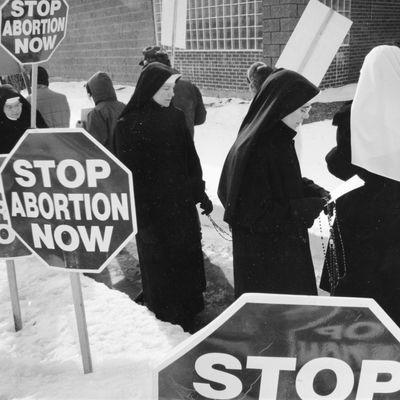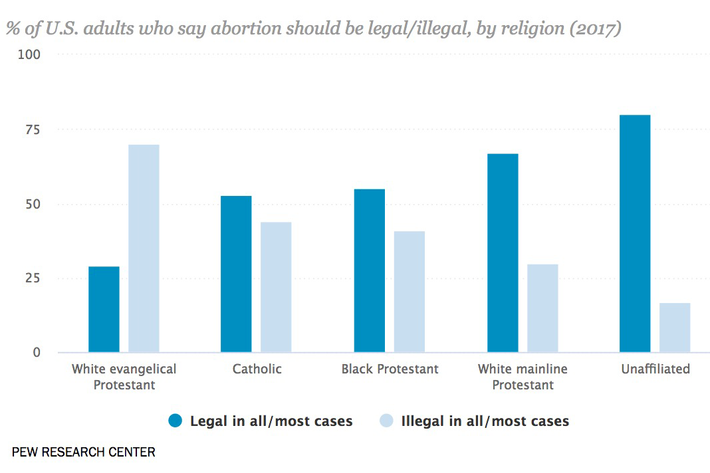
Looking at an article in the Washington Post about the frenetic activity in many states since 2010 aimed at enacting abortion restrictions, some in order to set up a legal challenge to Roe v. Wade, the American Prospect’s Harold Meyerson noticed a pattern, which he discussed in a subscription email to readers that I happen to receive.
Thirty-three states have enacted abortion restrictions since [2010], while just 17, plus the District of Columbia, have not.
What interested me about those two lists was the degree to which they didn’t align with the share of Roman Catholics in the states. The eight most heavily Catholic states—in order, Rhode Island (42 percent Catholic), Massachusetts (34 percent), New Jersey (34 percent), New Mexico (34 percent), Connecticut (33 percent), New York (31 percent), California (28 percent) and Illinois (28 percent)—were among the 17 that had not passed legislation curtailing abortion rights. Conversely, the 13 states with the lowest percentage of Catholics—in order, Mississippi (4 percent), Utah (5 percent), West Virginia (6 percent), Tennessee (6 percent), Alabama (7 percent), North Carolina (9 percent), Georgia (9 percent), South Carolina (10 percent), Kentucky (10 percent), Idaho (10 percent) and Virginia (12 percent)—were among the 33 states that have curtailed access to abortions since 2010.
In sum, the relationship between the number of Catholics in a state and the intensity of the state’s anti-abortion policies is completely inverse.
This fact might come as a surprise to people who still think of Catholics as the bedrock core of the right-to-life movement, as they undoubtedly were in the days immediately following Roe.
In fact, Catholic public opinion on abortion policy (as on most political topics) is pretty close to that of the country as a whole, which means marginally pro-choice. Here’s how the Public Religion Research Institute put it in a 2015 survey:
On the issue of abortion, Catholic attitudes generally mirror Americans overall. A majority (53%) of Americans say abortion should be legal in all or most cases, while 43% say it should be illegal. Among Catholics, a slim majority (51%) says abortion should be legal in all or most cases, compared to 45% who say it should be illegal.
A more recent survey from Pew showed Catholics favoring the “legal in all or most cases” position by a slightly slimmer 48/47 margin. Both surveys showed that white Catholics — i.e., those significantly more likely to identify with the anti-abortion Republican Party — were more likely to be pro-choice than overwhelmingly Democratic Latino Catholics.
This is not — repeat, not — to say that there aren’t a lot of passionately active RTL adherents in the U.S. Catholic ranks, who can rely on the consistent support of the hierarchy and the Vatican (and yes, despite some RTL angst about his recent statement that defending the poor was as important as defending the “unborn,” Pope Francis hasn’t given much aid and comfort to pro-choice Catholics).
But there’s no question the religious community that is far more solidly in the anti-abortion camp is white Evangelical Protestants. In a 2017 survey that broke out this particular segment of the population, Pew found that 70 percent of white Evangelicals thought that all or most abortions should be illegal. Less than half of Catholics (44 percent), black Protestants (41 percent), white mainline Protestants (30 percent), and the unaffiliated (17 percent) agreed with this position.

This is remarkable in no small part because unlike Catholics, white Evangelicals have little traditional investment in the anti-abortion cause. They have no formal hierarchy, no teaching tradition, no papal encyclicals, and no “natural law” philosophy leading them in the direction of regarding abortion as grievously sinful. They purport to follow only the Bible, which never mentions abortion and only obliquely refers to fetal life. Evangelicals, moreover, were not as a group actively engaged in state efforts to keep abortion illegal prior to Roe; many (particularly among Southern Baptists, the largest white Evangelical denomination) favored “liberalized” abortion laws back then.
However you choose to explain the white Evangelical shift toward strongly anti-abortion views — as a moral “awakening” after Roe; a general rejection of liberalism and feminism; a nostalgic embrace of cultural conservatism in all its elements (including patriarchy); or a byproduct of a growing alliance with conservative politics — it’s unmistakable, and it has offset the gradual drift toward pro-choice views among Catholics.
Getting back to Meyerson’s observation, most of the states he notes as having small Catholic populations along with virulently anti-abortion policies also have large white Evangelical populations (there’s also Utah, with an LDS majority that is culturally conservative and also has a strong church hierarchy doctrinally opposed to abortion). And not coincidentally, they all (with the partial exception of Virginia) are currently Republican-run states.
The polarization of the two parties on abortion policy stems from multiple sources, but none is so powerful as the shift in the anti-abortion “base” from a Catholic population that is more or less split down the middle between the two parties (and if anything leans Democratic) to a white evangelical population that has become aligned with Republicans on a broad range of issues from civil rights to taxes to “size of government” to the cultural issues like abortion and LGBTQ rights that we associate with the Christian right.
So the archaic view of abortion as primarily a “Catholic issue” needs updating for those who want to understand why some places are so hospitable to anti-abortion politics. It will matter even more if Donald Trump gets another SCOTUS nomination and we face the possibility of a post-Roe world where the very existence of reproductive rights depends on where women live.






























